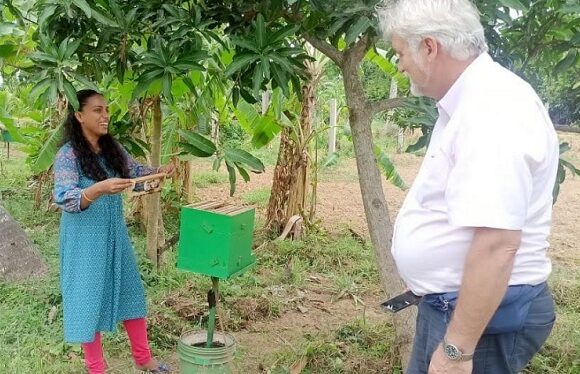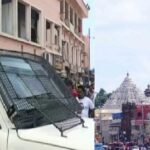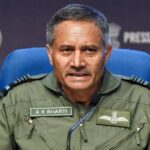A Bird’s Eye View on “Visadayoga” of Dr Phani Mohanty
Published by – Black Eagle Books, Dublin,USA
www.blackeaglebooks.org
Book reviewed by Dr Sonali Sahu
Visadayoga is a long poem of an eminent poet Dr Phani Mohanty, a Central Sahitya Akademi Awardee of Odisha presents a vivid picture of human minds hanging with torments and tribulation of life. This book deals with the concept of “VISADAYOGA” resembles the dilemma of Arjuna in Mahabharat. But this time it is not about Visada of Arjuna but the poet has come with a unique concept which focuses on the sorrow and traumatic life of every ordinary person living on this vast planet which has shaken the poet to its core.
“Each man’s fate is that of Arjuna’s
Every poet, too similar to
That of him” (page no-21, Visadayoga)
Here in these lines the poet has compared the confusing state of mind of Arjuna with every ordinary person floating on the ocean of materialistic life. Also,it discusses how modern acquisitive life improves our standard of living but it isolates human beings from moralities, ethics, culture, humanity and very importantly peace and tranquility which results in disappointment, despondent and despair. Today’s people are trapped in the “CHAKRAVYUHA” of greed and pessimism and confined into multiple defensive walls where he tries to find the way out but can’t. This worldly man is ensnared too pathetically in the wheel of malice (KURALA CHAKRA) which grips him and constricted his movement.The attrition of honesty and decent values in our world has become a phenomenon. Dr Mohanty laments to see the thirst of modern people for money, power and position leading us towards a way that has no destination.
The poet shows us the true sight of life by stating how people who live under one roof still are detached from each other. No sign of love and affection is found anywhere. Only pretension, servility and crowd of disguised characters everywhere. Society has become a barren desert due to lack of humankind. One thing surprises me that our great mythological stories show us the right path but unfortunately such values remained in the book itself. Ramayana taught us what to do and Mahabharat taught us what not to do. The modern people forgot Ramayana and followed Mahabharat which reflects on every relationship of this desolate world of greed and violence. After going through the preface of this book I found the poet laments on the issues of current days that howbrother kills brother for property, no faith on the institution of marriage,infidelity for transient pleasure , a tremendous visible gap amongst parents and children, love has been replaced with lust, assassination in temples, Gurdwaras and Masjids scatter the heart into pieces. Lots of confusion and dilemma in the mind and heart oscillates between right and wrong. The poet also paints in this book about the self-centered people busy in serving their own interests. Due to the spread of voracity, self-promotion, insensitivity, callousness the society is now degrading towards a world of devastation.
Here in “Visadayoga” through his poems and literary expressions, Dr Mohanty raises a bunch of questions deal with the day-to-day problems of life. He seems suffocated without getting answers of his queries. Poet Mohanty’s anguish represents the agony and dilemma of every single human beings of this so called advanced world. Here I would like to quote one of the excerpts of Bhagavad Gita where Arjuna asks a question to the Almighty to resolve his doubts and show him the path he must take.
Arjuna said: “O Janardan, if you consider knowledge superior to action then why do you ask me to wage this terrible war? My intellect is bewildered by your ambiguous advice? Please tell me decisively the one path by which I may attain the highest good.” (Chapter-3, Shloka 1-2, Bhagavad Gita)
The poetmight have got influenced from the Visadayoga part of Mahabharat, where Arjun had a dilemma whether to fight the battle of Mahabharat or not? What stopped him is his feeling of grief, a feeling that clouds his vision and makes his mind reel. But he was fortunate to have Lord Krishna by his side to answer all his questions and help him to get out of his dilemma.
But Dr Mohanty raises a very intellectual question in his book Visadayoga that we all are not lucky to have Lord Krishna on our side in his physical form to which we can surrender our doubts and all sorts of dilemmas raising suspicion in our minds. Then how can a person in a dilemma like Arjun take guidance? We all are victims of doubts on ourselves as well as others. We are in a dilemma to make a decision on what to do or not to do? Who will respond to our questions and solve our queries. Such questions make us restless and confused in every single minute of this life. The poem begins with the lines:
“From cradle to the grave
Life in its entirety
Is full of tribulations “ (page no- 19, Visadayoga)
In the above lines the poet has beautifully projected the disturbing but true image of modern world which is full of fear, insecurity, war, worry, grief and stress. Man feels bogged down and helpless. He does not understand what to do and how to come out of adverse circumstances?
Since time immemorial such questions and sufferings have become an inevitable chapter for human being where it seems there is no medium of escape. “To be, or not to be’ is the opening phrase of a speech delivered by prince Hamlet in the “nunnery scene” of the Bard of Avon William Shakespeare’s play Hamlet contemplates death and suicide weighing the pain and unfairness of life against the alternative, which might be worse. So, the concept indecisiveness in Visadayoga can be related to the greatest and longest drama of Shakespeare where because of dilemma the protagonist lost the power of his conscience.
Though the theme of this poem is familiar and resembles to the grief and Visada of Arjuna described in Bhagavad Gita but the way Dr Mohanty has amazingly played with incredible literary words, expressions and remarkable tone and rhythm in his poem, it undoubtedly takes readers to a world of sublime and tranquility and makes the poem supremely exceptional creation by a skilled artist what indeed Dr Mohanty is! This masterpiece “Visadayoga” has been translated into Hindi language by Prof Sankar Lal Purohit and English by poet Aswini Kumar Mishra. This book received the most prestigious Sahitya Akademi Award for its versatility and profundity in the year 1995 and Sahitya Sanskruti Samman in1994.
His indelible work ‘Priyatama’ is a long romantic poem established him as the king of romantic Odia poetry. But he successfully broke the statement not verbally but in his book “Visadayoga” that he is not confined into a single concept but he is the master of all poetic forms and themes. Yes ! Sometimes he is the romantic lover of an imaginary lady love in Priyatama and another time he is that normal human being of so called modern world who gets choked with pain and sufferings. complaints initially and eventually surrenders himself on the feet of almighty in visadayoga. In one hand love (Prem) and on the other hand despair (Visada) reflect the mastery over thoughts of the poet.
“In each case I would not do to
Distinguish between sin and virtue”
These lines of the poet from Visadayoga make me reminiscent the lines of “A Hymn to God the Father” written by Jonne Donne the metaphysical poet where he wishes to ask God about sin and forgiveness. Similarly, the line of Dr Mohanty “The grief more painful than death”(page no- 62,Visadayoga) connects to the situation of Arjun standing on the mid of the battlefield where the actual pain of him was his feeling of grief for losing his near and dear ones.
But Dr Mohanty has solved the riddles and dilemma of modern people the way Lord Krishna did for Arjun in the battle of Mahabharata by making the human conscience as one of the intangible forms of God.
After reading the poems minutely I have come to the conclusion Our own conscience acts as the words of supreme power at the time of need, helps us to get an apt solution to the problems and soothes the oscillating minds. You yourself are the confused Arjun and at the same time the supreme soul to resolve your conflicts, dilemmas and indecisiveness.







